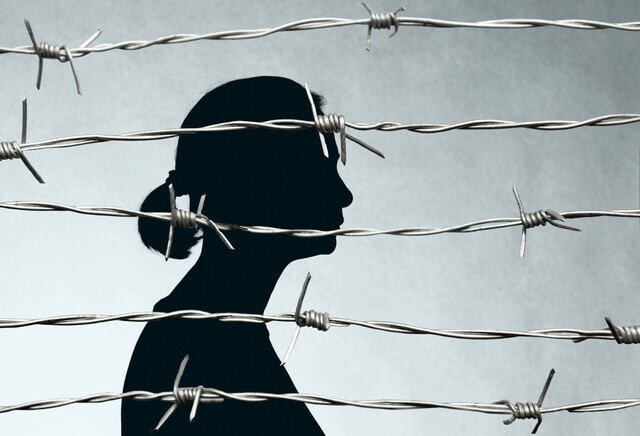hankyoreh
Links to other country sites 다른 나라 사이트 링크
Why asylum reapplicants in S. Korea are unable to rest easy

Koita Boh Saran is a 26-year-old Guinean woman who was forced to marry at the young age of 15. To escape abusive treatment by her family, she decided to move to South Korea in 2016, when she was 20 years old.
Entering the country as a student, she applied for refugee status, but was denied. The conclusion was that because she was now an adult, there was less likelihood that she would be forced to marry by her family if she returned to Guinea.
Saran resubmitted her application, to no avail. Staying in South Korea on a G-1 “miscellaneous” visa, she is required to visit her immigration office every six months to confirm that she will be allowed to extend her stay. She is not entitled to the cost of living support and employment permissions granted to people who have submitted their first refugee application.
While in South Korea, Saran met another foreign national and had a child with him. She now has a life here.
“I can’t go back now,” she said. “The forced marriage thing is still an issue, but my parents would have an even bigger issue now that I have children.”
“Last Lunar New Year, my second child was very sick, but I was told that hospitalization would cost 2 million won (US$1,500) because we didn’t have health insurance,” she recalled.
“We had no choice but to leave the hospital. I couldn’t stop crying because I was worried about my child,” she said.
For World Refugee Day on Monday, the National Human Rights Commission of Korea (NHRCK) issued a recommendation calling for improvements to Ministry of Justice (MOJ) measures that have placed restrictions on those staying in South Korea after reapplying for refugee status.
In its message to the Minister of Justice, the NHRCK called for “allowing the issuance of documents to prove refugee re-applicant status and developing procedures for support or employment permissions to guarantee minimum survival for those whose review period is inevitably drawn out.”
Currently, the MOJ’s guidelines for refugee applicant reviews and treatment define re-application by those denied the first time as a form of “application abuse,” while excluding re-applicants from sojourn permissions as a rule. They also extend a deferment of the departure deadline ranging from three to six months.
Re-applicants who are unable to extend their stays are no longer entitled to applications for cost of living support, permissible employment activities, or the use of immigration and international resident support centers.
“The current uniform restrictions applied to refugee status re-applicants originated in concerns about the unprecedentedly large number of refugee applications over the past few years and the resulting backlog in reviews,” the NHCRK noted.
“This could be criticized as a matter of skewed priorities,” it added.
“When there are cases of refugee re-applications that patently abuse the refugee application system, the decision on whether to grant refugee status should be based on expedited procedures, and it should stop penalizing re-applicants across the board in terms of sojourn conditions,” the commission suggested.
In his own statement the same day, NHRCK Chairperson Song Doo-hwan said, “In honor of World Refugee Day, the NHRCK urges the South Korean government to stop viewing refugee applications and re-applications as an ‘expedient’ for obtaining sojourn extensions and work instead to improve the related infrastructure, including more specialized review personnel, so that the refugee review process does not draw out into the long term.”
By Jang Ye-ji, staff reporter
Please direct questions or comments to [english@hani.co.kr]

Editorial・opinion
![[Editorial] Intensifying US-China rivalry means Seoul must address uncertainty with Beijing sooner than later [Editorial] Intensifying US-China rivalry means Seoul must address uncertainty with Beijing sooner than later](https://flexible.img.hani.co.kr/flexible/normal/500/300/imgdb/original/2024/0517/8117159322045222.jpg) [Editorial] Intensifying US-China rivalry means Seoul must address uncertainty with Beijing sooner than later
[Editorial] Intensifying US-China rivalry means Seoul must address uncertainty with Beijing sooner than later![[Column] When ‘fairness’ means hate and violence [Column] When ‘fairness’ means hate and violence](https://flexible.img.hani.co.kr/flexible/normal/500/300/imgdb/original/2024/0516/7417158465908824.jpg) [Column] When ‘fairness’ means hate and violence
[Column] When ‘fairness’ means hate and violence- [Editorial] Yoon must stop abusing authority to shield himself from investigation
- [Column] US troop withdrawal from Korea could be the Acheson Line all over
- [Column] How to win back readers who’ve turned to YouTube for news
- [Column] Welcome to the president’s pity party
- [Editorial] Korea must respond firmly to Japan’s attempt to usurp Line
- [Editorial] Transfers of prosecutors investigating Korea’s first lady send chilling message
- [Column] Will Seoul’s ties with Moscow really recover on their own?
- [Column] Samsung’s ‘lost decade’ and Lee Jae-yong’s mismatched chopsticks
Most viewed articles
- 1[Editorial] Transfers of prosecutors investigating Korea’s first lady send chilling message
- 2For new generation of Chinese artists, discontent is disobedience
- 3S. Korea “monitoring developments” after report of secret Chinese police station in Seoul
- 4[Photo] 1,200 prospective teachers call death of teacher “social manslaughter”
- 5[Exclusive] Unearthed memo suggests Gwangju Uprising missing may have been cremated
- 6[Column] Samsung’s ‘lost decade’ and Lee Jae-yong’s mismatched chopsticks
- 7[Column] When ‘fairness’ means hate and violence
- 8Xi, Putin ‘oppose acts of military intimidation’ against N. Korea by US in joint statement
- 9[Special reportage- part I] Elderly prostitution at Jongmyo Park
- 10[News analysis] Samsung in management crisis due to owner risk